- Home
- Diane Gaston
Valiant Soldier, Beautiful Enemy Page 9
Valiant Soldier, Beautiful Enemy Read online
Page 9
Emmaline could not allow herself to think of what horrors he’d seen. She must think only of Claude, how to keep him alive.
She forced herself to remain calm. “I will remove the ball.”
“Emmaline—” he began in a warning tone.
She set her jaw in resolve. “There is no other choice. I have seen it done before. I must try.”
She ran from the room and gathered any items she could think of that would help her remove the ball: her knitting needles, a long embroidery hook, tweezers, scissors. The sky was turning light. At least she would be able to see better.
Back in Claude’s room, she pushed the bed to the window and set her tools on the bed next to her son.
Gabriel rose from the chair. “I’ll hold him still.”
How he would have the strength to do so, she didn’t know, but he stood on the opposite side of the bed and held Claude’s shoulders. She carefully inserted the knitting needle into the wound to find the path of the musket ball. Claude’s eyes opened and he cried out. Gabriel held him fast.
Swallowing against a sudden wave of nausea, Emmaline did not have to probe far. “It is not deep!”
Her tweezers were about five inches long, plenty of length to reach the ball. It took several tries to pull it out, all the while Claude writhing with the pain of it. He quickly lost consciousness and became limp. Finally she manoeuvred the ball to the opening and was able to hold it between her fingers. Gabriel released Claude and leaned against the wall.
“One more thing if you can stand it,” she said to Gabriel. “I want to sew his head wound closed.”
Gabriel’s arms trembled as he held Claude’s head while Emmaline put thread and needle through the skin, but Claude did not regain consciousness.
“Sit down now,” she told Gabriel after she was done.
She bandaged the wounds and covered Claude with clean linens and a blanket. He again moaned, but it was a relief to hear him make any sound. Later, as she had done when he was ill as a child, she would spoon broth down his throat and wipe his brow with cool compresses if he became feverish. There was little else she could do.
She stepped back from his bed.
Gabriel rose. “I must leave.”
She touched his arm. “Take some food first. Something to drink.” She wanted to tell him not to leave her, to stay. With his steadying presence, she felt as if she could do anything to keep Claude alive. Without him, she was alone.
She walked downstairs with him and made him sit at the table where he’d sat so many happier times before.
“Just something to drink,” he said.
She gave him wine and he drank it like water.
“Now I must go.” He stood again and walked towards the door.
“Gabriel.” She ran to him as he opened the door. “Who won the battle?”
He gave her a weary look. “The Allies.”
She was relieved. When—if—Claude recovered, he would not return to the French army. There would be no need if the British had won. He could have a normal, peaceful life.
Gabriel put his hand on the doorknob again.
“Gabriel!” she called again.
He turned.
She swallowed against a threat of tears. “Thank you for my son.”
He touched her face with a gentle hand and started to walk away.
She seized his arm. “Gabriel. How did you find him? You said there were so many…”
Again a bleak look crossed his face. “The cuirassiers attacked. I saw him fall near me.”
“They let you save him?” Surely it would be difficult to protect a Frenchman when so many were in need.
His eyes turned hard. “No one could stop me.” He crossed the threshold and made his way to the gate and out of her life.
Emmaline leaned against the door jamb, tears burning her eyes, a sob choking her throat. What had he risked for her?
To save her son.
Chapter Seven
London—June 1817
Two years after the battle of Waterloo, Gabe’s life could not have been more altered. Waterloo had ended the war and Napoleon had been exiled to Saint Helena, far enough away in the south Atlantic to pose no further threat. For a time, Gabe’s Royal Scots had been part of the Army of Occupation in France. Gabe wished they’d been sent somewhere more distant, not so close to Brussels, not so filled with reminders of what he most wanted to forget.
The orders finally came that the whole battalion would be shipped to Canterbury. Once there, however, Gabe’s battalion was disbanded and he was placed on half-pay. In what seemed like an instant he had no regiment, no orders and literally nothing to do.
Now he was in London and, like other officers let loose in a non-military world, was haunting the Horse Guards hoping to discover a regiment looking for officers, or visiting the War Office to get the forms necessary to write to regimental agents for a commission to purchase. On this warm June afternoon Gabe strode into the War Office to pick up more copies of the form the office had run out of the week before. Gabe had performed this same errand the day before and the day before that, without success. He was not optimistic that this day would yield a different result.
Three other officers of his acquaintance were on their way out.
“Deane!” one of them cried, slapping him on the back. “Come for more forms, have you?” He spoke with a thick Irish accent that had earned him the nickname ‘Irishman’.
“Indeed,” Gabe responded without enthusiasm. “Are you going to tell me they have a new supply?”
Another man, Major Hanson, stepped up. “Not going to tell you that. Webberly even offered a bribe if the fellow would find him one copy, but apparently there are still none to be had today. Maybe tomorrow, the fellow said.”
Webberly, the third of the trio, shook his head. “I was certain a bribe would work.”
Gabe gave him an impassive look. “I’d be grateful for the opportunity to pay a bribe.” What else was he to do with his money?
Hanson jostled him. “Do not speak so loud. The clerks will smell a profit.”
The clerks already knew of Gabe’s willingness to bribe them for more forms. He’d made the offer days ago.
Irishman laughed. “Now, Captain Deane, my dear fellow, are you so eager for a commission? It would mean leaving our company and the fine accommodations of the Stephen’s Hotel.”
They all had rooms in the Stephen’s Hotel on Bond Street, a place popular with military men.
Gabe responded with sarcasm, “Not at all. I’m merely pining for the lost luxuries of army life.”
“You are wasting your time today, Deane,” Hanson told him. “Come with us. We plan to make great use of a tavern and deprive it of several pints of ale.”
It was tempting to seek the oblivion that alcohol could bring. Most of the officers at Stephen’s Hotel drank too much, but, after Brussels, Gabe had learned that whatever you wanted to drown with drink was still with you when morning came. Along with the devil of a headache.
“Not this time.”
The men bid him goodbye, and Gabe proceeded to the clerk’s desk anyway.
The clerk barely glanced at him. “No forms today. Maybe tomorrow.”
Gabe tapped on the man’s desk with a finger. “If the forms do arrive tomorrow, will you save me some?”
The clerk raised one brow. “For the amount we agreed upon?”
Gabe gave him a level stare. “Indeed.”
The clerk grinned. “We have a wager going here as to who among you officers will be the first to break down and accept a commission to the West Indies.”
The 1st battalion of the Royal Scots was stationed in the West Indies. There were always commissions open there, because so many officers caught fevers and died.
Gabe had survived that dreadful place once; he had no desire to chance it again, even if it would free him from the tedium of London.
Gabe had already travell
ed to Manchester, the home of his youth and where his family still resided, a place he’d not seen for at least ten years. It was nearly like going to a foreign land. Factories and warehouses had sprouted everywhere. Nieces and nephews had sprouted as well, too many for him to count. His mother and father had turned shockingly old and neither they nor his brothers or sisters seemed to know what to do with him.
He’d wound up spending most of his time with a twelve-year-old nephew who asked question after question about every battle on the Peninsula and every detail of Waterloo. The boy had reminded him of Emmaline’s Claude, or, more accurately, what he imagined Claude might have been like if not for Badajoz.
After a few weeks of intense discomfort on all sides, Gabe made an excuse to leave. He suspected the family was relieved he was no longer there to distract them from the routines of running what was now a very prosperous drapery warehouse. With Manchester’s new mills and a canal that improved the shipping of goods, the town seemed to have turned into a Garden of Eden for cloth merchants.
After Manchester, Gabe visited his uncle on the hill farm. Even that idyll was about to be lost. Stapleton Farm was up for sale and his uncle would soon be vying with younger men by the scores who were also seeking employment. Had matters turned out differently in Brussels, Gabe might have bought the place. He’d learned his lesson, though. He belonged in the army. No sense dreaming otherwise.
He’d returned to London and the tedious days of applying for a commission. What odds were offered that he would be the one to break down and go to the West Indies? Surely he’d be a safe bet.
“I’ll be back tomorrow,” he said to the clerk who’d already turned his attention back to the papers on his desk.
“Undoubtedly,” the man replied.
Gabe walked out of the office and back on to the street. He took a breath.
Lawd. He needed more to do. Exercising his horse in the morning and visiting the War Office or Horse Guards in the afternoon was simply not enough.
Most of his fellow officers attended society balls and other entertainments in the evenings, hoping to find a wealthy heiress to marry. Even that occupation was closed to Gabe. With the glut of younger sons in town, the son of a merchant was no matrimonial prize. Besides, marriage was not in the cards for him. He’d learned that lesson in Brussels.
Gabe walked slowly back to the hotel, ignoring the book shops, ironmongers, milliners and tea shops on Bond Street. Head down, he approached the entrance of Stephen’s Hotel, hoping not to see anyone he knew. He was not in a humour for friendly discourse on the weather or any other subject. As he entered the hotel, he removed his shako and threw his gloves inside it. Holding it under his arm, he crossed the hall, making his way to the stairway.
“Captain!” The footman who attended the lobby called after him. “Captain!”
He’d almost made good his escape. Turning, he fixed his fiercest glare on the unfortunate fellow.
The man took a step back. “Ah, sir.” He bowed. “You have a caller. Waiting in the front parlour.” The footman gestured to the room and withdrew posthaste.
Gabe clenched his hand into a fist. Who did he know in London who would call upon him? Allan Landon, perhaps? He’d seen Allan a few weeks ago, but neither of them had shared their direction. He knew other officers, but they were all staying in this hotel. If they wished to waste his time, they would simply knock at his door.
He rubbed his forehead.
On the other hand, he had written countless letters trying to find a commission. Maybe his caller had an answer for him.
He entered the room, dropping his hat on a table inside the door.
The parlour looked empty at first, although the curtains were open and fresh flowers were in a vase on the mantel.
A sound came from the high-backed chair facing the fireplace. A swish of skirts and a peek of a bonnet.
A woman?
She stood before him. “Bon jour, Gabriel.”
Emmaline.
She looked even more beautiful than the image of her that inhabited his dreams at night. Her lace-lined bonnet of natural straw perfectly framed her flawless face. The dark blue of her walking dress made her eyes even more vibrant.
Good God. After two years, she still had the power to affect him.
“What are you doing here?” His tone came out more sharply than he intended.
She clasped her white-gloved hands together. “I came to see you, Gabriel.”
He shook his head. “I meant, why are you in London?”
She fingered the front of her dress. “To see you.”
She had come to see him?
Gabe had laboured hard to bury the deep wound of losing her, but now she was here. Was it possible she’d regretted sending him away? Enough to travel this long distance to find him? Enough to search for him, to discover where he lived?
Against his better judgement, a tiny seed of hope germinated.
He managed to disguise the fact. “How did you find me?”
“With luck.” She smiled wanly. “A maid at my hotel said many officers stayed here.”
He really did not care about how she had found him. Only one question truly burned inside him. “Why did you come to see me?”
Her lips trembled before she spoke. “Oh, Gabriel. I need you.”
The hard earth he’d packed around his emotions began to crack.
She swallowed and went on, “I need your help.”
He came to his senses. “Help with what?”
She met his eye. “I need you to find Claude.”
“Claude.” The son who’d driven a wedge between them.
Of course it would be for Claude that she would travel all this way, to a foreign country that had so recently been at war with her birthplace.
She stepped closer to him. “It is so terrible. He is here in England.” Her gaze still managed to hold him in thrall. “Do you remember how he was so filled with hatred?”
Could he forget?
She took a breath. “He became a cuirassier to get revenge for—for what happened at Badajoz. What happened to his father. And to me. All these years Claude has not forgotten any of it. Fighting the English in the war was supposed to be the revenge, but, alors, you know what happened.”
“Why come to England, then, if he hates it so?” Wouldn’t Claude want to stay away and keep his mother away, as well?
She wrung her hands. “He remembers one name from that day—Edwin Tranville. He has come to England to kill him.”
Edwin Tranville. Gabe pressed his fingers against his temple. Damned Edwin Tranville. “What has this to do with me, Emmaline?”
Her eyes pleaded. “I need you to find Claude and stop him.”
What a fool he was. She’d come to England for her son, not for him.
He gave her a level look. “What makes you believe I would help you?”
She lowered her gaze so that her long dark lashes cast shadows on her cheeks. “Oh, Gabriel. Who else can help me? I cannot go to—to the gendarmerie and tell them my son wants to kill a man. I might as well send Claude to a guillotine. I came to you, because I do not know anyone else.” Her voice cracked with emotion. “I know only you.”
Her emotion shook him. He paced in front of her. “Well, I cannot help you.” His response was firm. “I have my own life to attend to, Emmaline. I am waiting for a new commission. Word could come any day and, when it comes, I must be here or the position will go to someone else.”
“You are not in the army any more?” Her gaze flicked over his uniform coat and her brow creased as if in confusion.
“My regiment was disbanded. I’m on half-pay.”
“Half-pay? What is that?” Her eyes widened suddenly and her voice rose. “Do you need money, Gabriel? I can pay you money to help me.”
“I do not need money,” he snapped. What he needed she could not give him, not without forsaking her son. “The army pays half of a salary when a s
oldier is idled, but do not concern yourself. I have plenty of money.”
“Even so…” she fingered the front of her dress “…I will pay for your help.”
Did she think he would accept money for such a thing? It galled him that she would presume they could make some sort of business arrangement after what they’d had together.
What he thought they’d had.

 The Lord's Highland Temptation (HQR Historical)
The Lord's Highland Temptation (HQR Historical) The Liberation of Miss Finch
The Liberation of Miss Finch The Lord's Highland Temptation
The Lord's Highland Temptation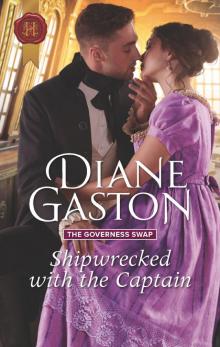 Shipwrecked with the Captain
Shipwrecked with the Captain Her Gallant Captain at Waterloo
Her Gallant Captain at Waterloo Chivalrous Captain, Rebel Mistress
Chivalrous Captain, Rebel Mistress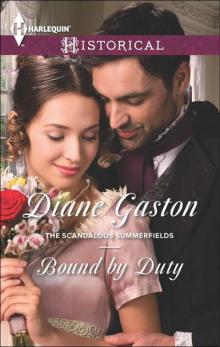 Bound by Duty
Bound by Duty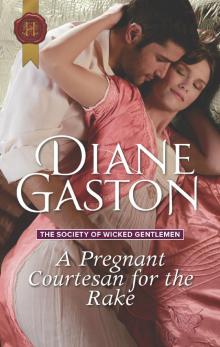 A Pregnant Courtesan for the Rake
A Pregnant Courtesan for the Rake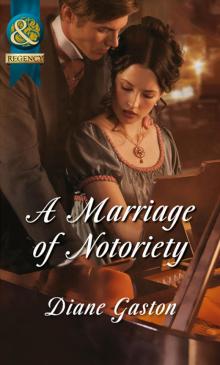 A Marriage of Notoriety
A Marriage of Notoriety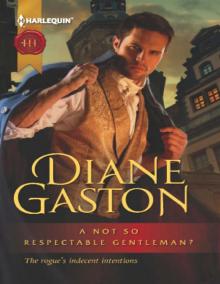 A Not So Respectable Gentleman?
A Not So Respectable Gentleman? Valiant Soldier, Beautiful Enemy
Valiant Soldier, Beautiful Enemy A Reputation for Notoriety
A Reputation for Notoriety The Wagering Widow
The Wagering Widow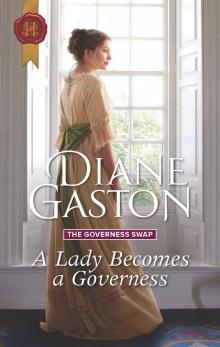 A Lady Becomes a Governess
A Lady Becomes a Governess Regency Wagers
Regency Wagers Born to Scandal
Born to Scandal Bound by Their Secret Passion
Bound by Their Secret Passion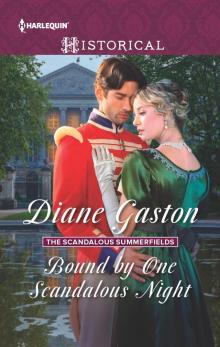 Bound by One Scandalous Night
Bound by One Scandalous Night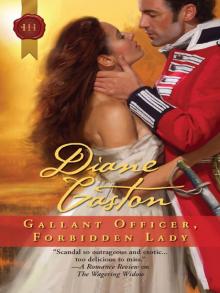 Gallant Officer, Forbidden Lady
Gallant Officer, Forbidden Lady Bound by a Scandalous Secret (The Scandalous Summerfields)
Bound by a Scandalous Secret (The Scandalous Summerfields) Innocence and Impropriety
Innocence and Impropriety